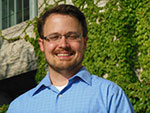Helping Students Explore Environmental Biology
Master of Biotechnology program (MBP) Research Preceptor George Wells talks about civil and environmental engineering and his work with MBP students.
Research makes up approximately 40% of the curriculum for students in Northwestern Engineering's Master of Biotechnology program (MBP), and a key component of the experience is connecting students with research preceptors from across the University.
 "The focus on research for MBP students is extremely important as they enter the workforce," said George Wells, assistant professor of civil and environmental engineering. "Practical 'hands-on' training really sets MBP students apart."
"The focus on research for MBP students is extremely important as they enter the workforce," said George Wells, assistant professor of civil and environmental engineering. "Practical 'hands-on' training really sets MBP students apart."
Wells is one of the dozens of research preceptors who work with MBP students, and he recently took the time to talk about his work with them and the research done in his lab.
How do you describe your research to someone with little understanding of civil or environmental engineering?
My research program lies at the interface of environmental biotechnology and microbial ecology, with an emphasis on the study of microbial diversity, dynamics, interactions, and function in engineered and impacted natural systems. My research group asks how complex microbial communities assemble, function, and fluctuate over time and space. We then seek to put these microbial communities to work to clean water, generate energy, prevent nutrient pollution, and recover useful resources from urban waste streams.
The end goal of our research is to deepen knowledge of microbial ecology to devise innovative microbial community management strategies that enable low-cost, sustainable environmental and public health protection, generation of renewable energy, and recovery of valuable resources like nutrients, materials, value-added chemicals and clean water from wastewater and other low-value societal “waste” products.
What do you enjoy most about your research?
I most enjoy connecting new fundamental understandings about the microbial world to innovative technological solutions for public health and ecosystem protection coupled with resource recovery. What motivates me is connecting the dots between the fascinating and amazingly diverse naturally occurring microbial communities —known as "microbiomes" — that surround us and new approaches to sustainable, resilient, and circular urban systems. Key themes or applications that I’m particularly excited about are:
- Using microbial communities to produce bioenergy or bioproducts
- Nutrient pollution prevention and recovery as a fertilizer
- Biodegradation of emerging contaminants, including microplastics
- Understanding microbial greenhouse gas production
What do you think is the biggest misunderstanding about biotech?
Perhaps one common misperception about biotech is that it is reliant on the engineering of new metabolic pathways or organisms. This is, of course, a powerful approach — but in environmental biotechnology, we harness naturally occurring microbial metabolic diversity to perform useful services for society, like cleaning water, producing energy, and generating biobased products from societal “waste” streams. The microbial world — particular in soil and natural aquatic systems — is inherently extraordinarily diverse, and we are only now beginning to understand the microbiome of various environments and to develop ways to leverage this diverse resource for a greener future.
What do you hope students who do research with you learn from the experience?
More than anything else, I hope students develop a sense of excitement, passion, and curiosity about environmental biotechnology and microbiology. An equally important goal is for students to gain an understanding of how research works in practice. In particular, research often is not a straight line but relies on serendipitous discoveries and u-turns that ultimately lead to impact and new understanding. Of course, I also hope students gain domain knowledge and useful experimental or methodological skill sets.
What do you think differentiates MBP from other comparable programs?
Direct connections to cutting edge research in a diverse range of biotech applications.
What advice would you give to a prospective student considering MBP?
MBP is a phenomenal program. It rewards curious, driven, and idealistic students looking for the cutting edge of biotech research and application.

